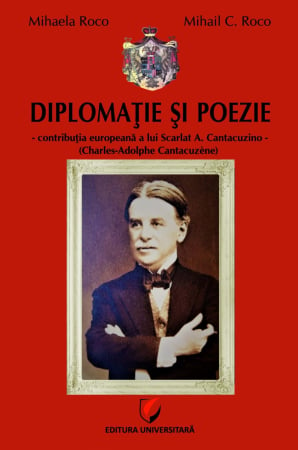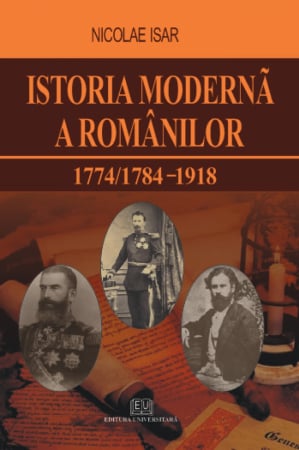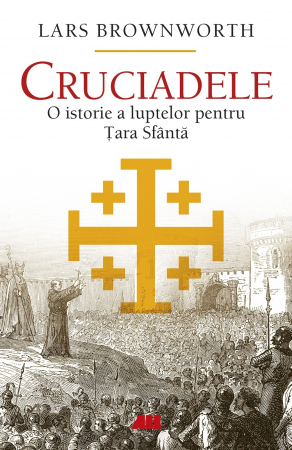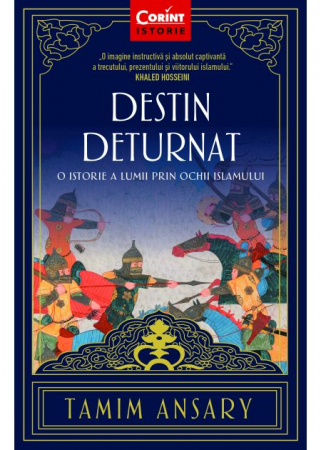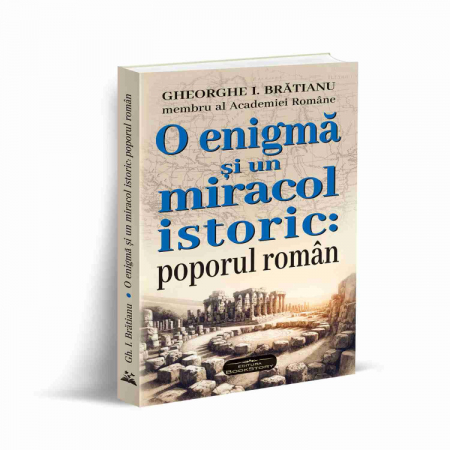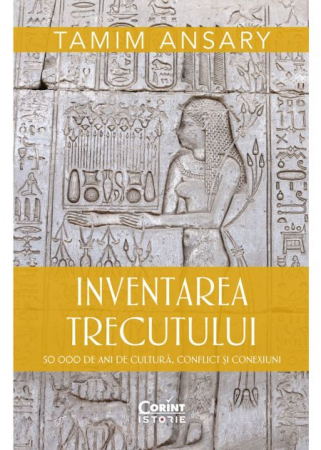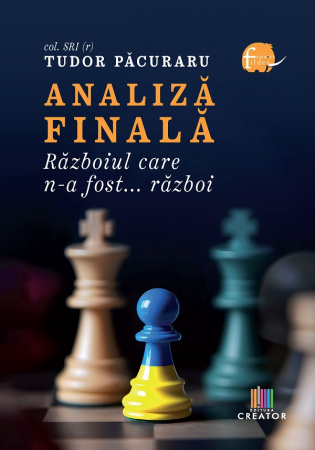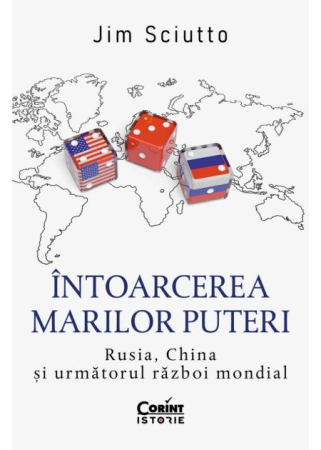Manuscript proposals: [email protected] / 0745 204 115 //// Tracking orders Individuals / Sales: 0745 200 357 / Orders Legal entities: 0721 722 783
Volume awarded with the SECOND PRIZE within the Manuscript Contest FULFILL A DREAM - SCIENTIFIC BOOK section
ISBN: 978-606-28-1319-2
DOI: https://doi.org/10.5682/9786062813192
Publisher year: 2021
Edition: I
Pages: 238
Publisher: Editura Universitară
Author: Ovidiu Mihalache
Product Code:
9786062813192
Do you need help?
0745 200 357
- Description
- Download (1)
- Authors
- Content
- More details
- Reviews (0)
In this book, the author seeks the resources, motives and principles that will lead him to identify the Russian imperial mentality. A difficult and perhaps impossible task to complete, especially since the mentality of all imperial peoples is itself difficult to decipher. However, consulting a vast bibliography, in Romanian and English, carefully analyzing the Soviet archives and translating original documents from Russian, Ovidiu Mihalache manages to write a very interesting and attractive book for many categories of readers, whether specialists or simple passionate about contemporary history. A complex work, which surprises by the originality of the vision, by the comparisons between the civilizing missions of the empires and mirrors the missions assumed by the British Empire and the Russian Empire. Moreover, Ovidiu Mihalache analyzes, in detail, the pan-Orthodox mission that the Russians appropriated and, especially, their claim to consider themselves the Third Rome.
The idea of the Russian imperial mentality is the central issue of the volume, developed on the three instruments that the Russians used in their relations with Eastern countries: pan-Orthodoxy (religion as a manifestation of the imperial attitude), pan-Slavicism as an excuse for the older brother attitude. ) and Bolshevism (doctrine as a reason for the strangulation of national sovereignty).
The idea of the Russian imperial mentality is the central issue of the volume, developed on the three instruments that the Russians used in their relations with Eastern countries: pan-Orthodoxy (religion as a manifestation of the imperial attitude), pan-Slavicism as an excuse for the older brother attitude. ) and Bolshevism (doctrine as a reason for the strangulation of national sovereignty).
-
Under the sign of the empire
Download
OVIDIU MIHALACHE
Engineer, prose writer, publicist, born on April 7, 1968, in Stefanesti, Botosani County.
Education: graduate of the Military Technical Academy in Bucharest in 1992.
Published scientific papers:
1. Theories of civil-military relations, "Perspectives on security and defense in Europe", Center for Strategic Studies, National Defense University, Bucharest, 2010, vol. 4, page 28
2. Military values between politics and dogma, Scientific communication - Scientific communication session with international participation STRATEGY XXI, of the National Defense University "Carol I", with the theme: Security and European defense in the context of economic and financial crisis (Security and defense section, 15-16.04.2010)
3. The idea of civilizing expansion in the Russian political mentality, Scientific communication - Scientific communication session with international participation STRATEGY XXI, of the National Defense University "Carol I", on: Security and European defense in the context of economic and financial crisis (section Security and defense, 15-16.04.2010)
4. Russia and neo-imperialism in European relations, in "The impact of the evolution of international relations on the security environment", Ed. U.N.Ap., Bucharest, 2010, pp. 404-410.
5. The revolution of December 1989 - the value of freedom - Ovidiu Mihalache and Sorin Marcel Colesniuc (coord.), Ed. Etnous, Brasov, 2013
Prose:
1. Parallel realities - short prose - Ed. Ex Ponto, Constanta, 2018
2. She-Wolf - short prose - Ed. Ex Ponto, Constanta, 2019
3. The Great Swirl - novel - Ed. Ex Ponto, Constanta, 2021
Journalism works (extras)
1. Bessarabia, back to Mother Russia !, September 6, 2010, www.ziare.com
2. August 23 - The forgotten holiday of the Romanians, August 23, 2010, Q-Magazine, no. 88
3. The Black Sea - between Russia's ambitions and Turkey's pride, August 23, 2010, Q-Magazine, no. 88
4. Espionage show in Moscow, August 23, 2010, Q-Magazine, no. 88
5. Russia celebrates, two years after the crushing of Georgia, August 9, 2010, www.ziare.com
6. The war of Mihai Ghimpu and the anxieties of Russia, July 19, 2010, Q-Magazine, no. 86
7. Russia Offensive or Hamburger Pact !, June 28, 2010, www.ziare.com
8. I am also Moldovan Mr. Marian Lupu !, May 19, 2010, Revista Basarabia Literara
9. Mihai Ghimpu a symbol of the national rebirth ?, April 27, 2010, www.ziare.com
10. Moscow calls its vassals to the parade, April 23, 2010, www.ziare.com
11. Russia and Ukraine - an agreement for the peace of the Black Sea ?, April 22, 2010, www.ziare.com
12. Bessarabia and the Russians !, April 7, 2010, www.ziare.com
13. Colonial Russia - the failure of Vladimir Putin's policy, April 2, 2010, www.ziare.com
14. The crumbs of democracy in Chisinau, March 22, 2010, www.ziare.com
15. Ukraine - Russia's political revenge !, February 25, 2010, www.ziare.com
16. KGB - My Love !, February 18, 2010, www.ziare.com
17. Vladimir Voronin - political autopsy of a militia general, February 12, 2010, www.ziare.com
18. Hillary Clinton and Sergei Lavrov - two chess masters, February 9, 2010, www.ziare.com
19. The Yalta Accords and the Hypocrisy of Russia, February 8, 2010, www.ziare.com
20. Transnistria - the bankruptcy of an enclave, February 7, 2010, www.ziare.com
21. Millstones from Chisinau, January 28, 2010, www.ziare.com
22. Ukraine, nationalist rhetoric and hatred of Romanians, January 26, 2010, www.ziare.com
23. Moscow on fire, January 31, 2011, Q-Magazine, no. 99
24. The revolution of communism, November 1, 2010, Q-Magazine no. 93
Engineer, prose writer, publicist, born on April 7, 1968, in Stefanesti, Botosani County.
Education: graduate of the Military Technical Academy in Bucharest in 1992.
Published scientific papers:
1. Theories of civil-military relations, "Perspectives on security and defense in Europe", Center for Strategic Studies, National Defense University, Bucharest, 2010, vol. 4, page 28
2. Military values between politics and dogma, Scientific communication - Scientific communication session with international participation STRATEGY XXI, of the National Defense University "Carol I", with the theme: Security and European defense in the context of economic and financial crisis (Security and defense section, 15-16.04.2010)
3. The idea of civilizing expansion in the Russian political mentality, Scientific communication - Scientific communication session with international participation STRATEGY XXI, of the National Defense University "Carol I", on: Security and European defense in the context of economic and financial crisis (section Security and defense, 15-16.04.2010)
4. Russia and neo-imperialism in European relations, in "The impact of the evolution of international relations on the security environment", Ed. U.N.Ap., Bucharest, 2010, pp. 404-410.
5. The revolution of December 1989 - the value of freedom - Ovidiu Mihalache and Sorin Marcel Colesniuc (coord.), Ed. Etnous, Brasov, 2013
Prose:
1. Parallel realities - short prose - Ed. Ex Ponto, Constanta, 2018
2. She-Wolf - short prose - Ed. Ex Ponto, Constanta, 2019
3. The Great Swirl - novel - Ed. Ex Ponto, Constanta, 2021
Journalism works (extras)
1. Bessarabia, back to Mother Russia !, September 6, 2010, www.ziare.com
2. August 23 - The forgotten holiday of the Romanians, August 23, 2010, Q-Magazine, no. 88
3. The Black Sea - between Russia's ambitions and Turkey's pride, August 23, 2010, Q-Magazine, no. 88
4. Espionage show in Moscow, August 23, 2010, Q-Magazine, no. 88
5. Russia celebrates, two years after the crushing of Georgia, August 9, 2010, www.ziare.com
6. The war of Mihai Ghimpu and the anxieties of Russia, July 19, 2010, Q-Magazine, no. 86
7. Russia Offensive or Hamburger Pact !, June 28, 2010, www.ziare.com
8. I am also Moldovan Mr. Marian Lupu !, May 19, 2010, Revista Basarabia Literara
9. Mihai Ghimpu a symbol of the national rebirth ?, April 27, 2010, www.ziare.com
10. Moscow calls its vassals to the parade, April 23, 2010, www.ziare.com
11. Russia and Ukraine - an agreement for the peace of the Black Sea ?, April 22, 2010, www.ziare.com
12. Bessarabia and the Russians !, April 7, 2010, www.ziare.com
13. Colonial Russia - the failure of Vladimir Putin's policy, April 2, 2010, www.ziare.com
14. The crumbs of democracy in Chisinau, March 22, 2010, www.ziare.com
15. Ukraine - Russia's political revenge !, February 25, 2010, www.ziare.com
16. KGB - My Love !, February 18, 2010, www.ziare.com
17. Vladimir Voronin - political autopsy of a militia general, February 12, 2010, www.ziare.com
18. Hillary Clinton and Sergei Lavrov - two chess masters, February 9, 2010, www.ziare.com
19. The Yalta Accords and the Hypocrisy of Russia, February 8, 2010, www.ziare.com
20. Transnistria - the bankruptcy of an enclave, February 7, 2010, www.ziare.com
21. Millstones from Chisinau, January 28, 2010, www.ziare.com
22. Ukraine, nationalist rhetoric and hatred of Romanians, January 26, 2010, www.ziare.com
23. Moscow on fire, January 31, 2011, Q-Magazine, no. 99
24. The revolution of communism, November 1, 2010, Q-Magazine no. 93
PREFACE / 7
ARGUMENT / 13
INTRODUCTION / 23
CHAPTER I - Imperialism / 35
I.1. Other empires and "imperialist" Romania / 40
I.2. Defining Russian imperialism / 44
I.3. Russia and imperial consciousness / 57
CHAPTER II - The Third Rome / 69
II.1. The instrument of pan-orthodoxy / 69
II.2. The Russian-Muscovite state and its "divine" origin / 76
II.3. From the "anointed of God" to the "representative of the working class" / 92
II.4. The Russians must worship someone / 95
II.5. About Stalin and his Christian education / 100
II.6. Russian imperialism and mythology for internal use / 103
CHAPTER III - The Instrument of Pan-Slavism / 111
CHAPTER IV - The Instrument of Communist Internationalism / 120
IV.1. The Bolshevik idea / 120
IV.2. The Hungarian Revolution and the Initiation of the Revolutionary Export / 131
CHAPTER V - Russia and the Black Sea Obsession / 136
CHAPTER VI - Interwar Romania / 143
VI.1. Interwar Geopolitics / 144
VI.2. Romania's foreign policy in the interwar period / 147
CHAPTER VII - The Romanian-Russian relationship / 161
VII.1. The preoccupations of the foreign policy of the Soviet Union / 163
VII.2. Interwar Russian diplomacy against Romania / 171
VII.3. Roman-Polish similarities / 188
VII.4. Russian theses about Bessarabia / 191
VII.5. Characteristics of the Romanian-Russian relationship after the First World War / 194
VII.6. Russian subversion in Romania / 211
CONCLUSIONS - From the Russian imperial mentality to Eurasianism, through Sovietism / 227
BIBLIOGRAPHY / 233
ARGUMENT / 13
INTRODUCTION / 23
CHAPTER I - Imperialism / 35
I.1. Other empires and "imperialist" Romania / 40
I.2. Defining Russian imperialism / 44
I.3. Russia and imperial consciousness / 57
CHAPTER II - The Third Rome / 69
II.1. The instrument of pan-orthodoxy / 69
II.2. The Russian-Muscovite state and its "divine" origin / 76
II.3. From the "anointed of God" to the "representative of the working class" / 92
II.4. The Russians must worship someone / 95
II.5. About Stalin and his Christian education / 100
II.6. Russian imperialism and mythology for internal use / 103
CHAPTER III - The Instrument of Pan-Slavism / 111
CHAPTER IV - The Instrument of Communist Internationalism / 120
IV.1. The Bolshevik idea / 120
IV.2. The Hungarian Revolution and the Initiation of the Revolutionary Export / 131
CHAPTER V - Russia and the Black Sea Obsession / 136
CHAPTER VI - Interwar Romania / 143
VI.1. Interwar Geopolitics / 144
VI.2. Romania's foreign policy in the interwar period / 147
CHAPTER VII - The Romanian-Russian relationship / 161
VII.1. The preoccupations of the foreign policy of the Soviet Union / 163
VII.2. Interwar Russian diplomacy against Romania / 171
VII.3. Roman-Polish similarities / 188
VII.4. Russian theses about Bessarabia / 191
VII.5. Characteristics of the Romanian-Russian relationship after the First World War / 194
VII.6. Russian subversion in Romania / 211
CONCLUSIONS - From the Russian imperial mentality to Eurasianism, through Sovietism / 227
BIBLIOGRAPHY / 233
In this book, the author seeks the resources, motives and principles that will lead him to identify the Russian imperial mentality. A difficult and perhaps impossible task to complete, especially since the mentality of all imperial peoples is itself difficult to decipher. However, consulting a vast bibliography, in Romanian and English, carefully analyzing the Soviet archives and translating original documents from Russian, Ovidiu Mihalache manages to write a very interesting and attractive book for many categories of readers, whether specialists or simple passionate about contemporary history. A complex work, which surprises by the originality of the vision, by the comparisons between the civilizing missions of the empires and mirrors the missions assumed by the British Empire and the Russian Empire. Moreover, Ovidiu Mihalache analyzes, in detail, the pan-Orthodox mission that the Russians appropriated and, especially, their claim to consider themselves the Third Rome.
The idea of the Russian imperial mentality is the central issue of the volume, developed on the three instruments that the Russians used in their relations with Eastern countries: pan-Orthodoxy (religion as a manifestation of the imperial attitude), pan-Slavicism as an excuse for the older brother attitude. ) and Bolshevism (doctrine as a reason for the strangulation of national sovereignty).
From the Argument at the beginning of the volume we learn, among other things, that the Russians "never looked for reasons, but only pretexts for their abusive behavior" and that the Soviets represented "the more than 60 peoples, nations and ethnicities" conquered by their descendants. The author also formulates some conclusions, such as: systemic crises are recurrent in the history of Russia and of short duration; Russia has never allowed periods of political recession to greatly influence its own interests; Moscow never abandoned its imperial ambitions. Also here, Ovidiu Mihalache makes known the purpose for which he initiated this research: “an introspection into the Russian / Soviet political culture to determine, at least in part, the way in which the Russians / Soviets relate to Europe and, in particular, to Romania".
In the Introduction, the author of the volume presents the historical period on which his research focused; the ambitions of Stalin and the Bolsheviks for Russia to become a great power again; relations between Romania and Russia summarized in three stages, etc. He also recalls that Russia is "an empire offensively oriented towards Europe" and that "although the territory of Siberia is four times larger than Europe, the Russians do not only want to own land and resources, they want to rule and people, to turn them into Soviets or, in a 21st century form, into neo-Russians.”
The author also states that Russian imperialism has not undergone any change with the coming to power of the communists, but only the instruments of internal control of the population have been replaced, which he intends to demonstrate in this volume. Likewise, foreign policy instruments remained unchanged, although not many diplomats and historians understood this: "The Soviets did not criticize the Tsarist Empire for its foreign policy, they only criticized the fact that they, the Bolsheviks, in power, did not apply the same policy. ”
In the first chapter, entitled Imperialism, after defining imperialism, in general, and Russian imperialism in particular, Ovidiu Mihalache discusses Lenin's accusation that Romania is an imperialist state, the thesis taken over by the Comintern. According to this thesis, "Romania is an aggressive state, an outpost of imperialism on the border of the Soviet Union, which is preparing an armed aggression against the Soviet state." However, the author explains the purpose pursued by Russian propaganda.
Emil Cioran's statement seems interesting and very appropriate here: "Any people that enters history, when the others are mature, suffers from an imbalance caused by historical inequalities." Over time, having experience in leading the poor masses, the Russians invented theories such as Slavophilism, Pan-Slavism, Pan-Orthodoxy, Communism and Eurasianism, pseudo-ideologies they used to justify their actions and which were successful in states such as Ukraine, Belarus, Moldova and the Caucasus states, but failed in those beyond the Carpathians.
From a political point of view, says Ovidiu Mihalache, Russia is still in the medieval era and continues to divide the world into areas of influence. It is not able to decisively influence the economic component of international relations. In this sense, energy exports are not enough. An important element of Russian political mythology is the myth of the eternal enemy, which is of two types: the great powers with continental influence and the local enemies on the borders of the empire.
In the second chapter, called The Third Rome, he discusses the concept, following its historical antiquity and emphasizing that this phrase refers to the claims of some states (or even cities) to be considered the legal successor of the Byzantine Empire, a strongly supported idea. by the Russians since the reign of Ivan III, prince of Moscow, who considered himself heir to the Byzantine Empire.
Thus, the Russians are beginning to consider themselves the last bastion of Christianity, a religion that collapsed under the blows of the Catholic heresy and the Islamic religion. But in their attempt to create this image of Third Rome, integrative, pure and glorious, the Russians did nothing but create an unsuccessful copy of the Roman Empire.
The third chapter, entitled The Instrument of Pan-Slavism, draws attention to the fact that, although some historians or political scientists claim that pan-Slavism no longer exists or has lost its force, it exists even in its primary form. One of the proofs is the coercion of Ukraine, Belarus and Kazakhstan to gravitate exclusively around Moscow. The forced incorporation of the eastern states into the communist bloc was based on a derivative of pan-Slavism, called internationalism. During the communist period, Russian expansionism was hidden under slogans such as the class struggle or the international proletarian movement.
The fourth chapter, the Instrument of Communist Internationalism, talks about the establishment of the Comintern, about the amplification of the communist struggle after 1928, about the application of the communist ideology at the international level, etc. The activity of the Romanians in the Comintern "was non-existent or negligible, compared to the contribution of other nations from the East", the author mentions. In the first years, Romania was not represented at the Comintern congress, in the decision-making forums and in the administrative apparatus.
Ovidiu Mihalache outlines some conclusions: Soviet Russia was not recognized in the system of international relations, but presented itself as the main opponent of American capital; the Russians intended to create ideological and subversive buttresses in the capitalist states, which would destabilize political regimes and promote Russian interests; Russia excluded national liberation movements in the Balkan states.
The fifth chapter is dedicated to Russia and its obsession with the Black Sea. From the beginning, the author states that, since the time of Peter the Great, Russia has carried out permanent offensives, on all levels, for access to the open seas and the planetary ocean. However, the desire to control the Black Sea would remain a constant in Russian foreign policy.
Ovidiu Mihalache considers that Russia's obsession with the Black Sea has three forms of manifestation: the military form (starting with the medieval period and until the middle of the twentieth century), the political form of Russian expansionism (after the Second World War) and pragmatic politics currently, which supports the economic factor as the main driver of expansion. Thus, Russian historiography has a predominant justifying character of political actions and not an explanatory one, of historical events.
In the sixth chapter, Interwar Romania, the geopolitical situation of the Romanians is approached, coming out victorious from the First World War, but having no viable ally, even if they had tried agreements with smaller neighbors. The interwar period is defined by the author as having three main directions: the effort of the Romanian diplomacy for the recognition of the union of Bessarabia, Northern Bukovina and Transylvania with Romania; the futility of the policy of interwar alliances and the Russian perspective on them; the evasive policy of the great powers and the definition of particular interests. Transylvania had remained the apple of discord between Romania and Hungary, and Russia did not accept in any form the union of Bessarabia with Romania.
After the conclusion of various alliances (accession to the League of Nations, the Little Entente, the Balkan Understanding, the Briand Kellog Pact and several treaties with Poland, France, Italy), all having a defensive character, and after the signing of the Munich Agreement. Germany's southern region of Czechoslovakia, Romania understands that its system of alliances has ended.
In the seventh and last chapter, entitled The Romanian-Russian Relations, it is mentioned that, east of the Dniester, the Romanians "always had peoples who threatened either their existence, or their statehood, or their territory or economic stability." An important reason for Russian politics was the presence of a Latin people among them and Hungarians, Czechs, Yugoslavs, Poles and Slovaks. Both the Russians and the Austro-Hungarians feared the unification of the Romanians and the consolidation of their national state.
Romania and Russia were allies in three wars (1877 1878, 1916 1917, 1944 1945), but each time Moscow tried to minimize Romania's contribution and undermine Romania's position in the peace negotiations in Berlin, Versailles and Paris. notes Ovidiu Mihalache. Russia has always viewed its neighbors as its own provinces.
On the part of Conclusions, which he calls From the Russian imperial mentality to Eurasianism, through Sovietism, Ovidiu Mihalache makes an analysis of the Russian mentality. Here, the author makes the following mention: "The moment of 1990 caught the Russians without a clearly defined country, with a multitude of autonomous republics, when they, as a nation, had to understand that internationalism is no longer valid and that it is needed. of geopolitics. ” An interesting conclusion stated by the author: "No matter how strong a leader or regime may be in Moscow, it cannot fail to bow to the mental expectations and customs of the Russian people, who expect political and military victories and whose dignity is directly proportional to the number of defeated enemies. "
Supported by a rich bibliography, general and specialized, including archive and periodical documents, the volume Under the Sign of the Empire is not necessarily a historical work, in the literal sense. It's not just about history. It is not a template work to list the facts so that, later, to look for meanings. Ovidiu Mihalache builds a volume that deals with social mentalities that migrate to the imperial mentalities of some people from a historical period and, later, the author adds historical data. It is a work that will surely be well received both by specialists in modern and contemporary history, and by the general public passionate about history.
Scientific researcher Dr. Sorin Marcel COLESNIUC
The idea of the Russian imperial mentality is the central issue of the volume, developed on the three instruments that the Russians used in their relations with Eastern countries: pan-Orthodoxy (religion as a manifestation of the imperial attitude), pan-Slavicism as an excuse for the older brother attitude. ) and Bolshevism (doctrine as a reason for the strangulation of national sovereignty).
From the Argument at the beginning of the volume we learn, among other things, that the Russians "never looked for reasons, but only pretexts for their abusive behavior" and that the Soviets represented "the more than 60 peoples, nations and ethnicities" conquered by their descendants. The author also formulates some conclusions, such as: systemic crises are recurrent in the history of Russia and of short duration; Russia has never allowed periods of political recession to greatly influence its own interests; Moscow never abandoned its imperial ambitions. Also here, Ovidiu Mihalache makes known the purpose for which he initiated this research: “an introspection into the Russian / Soviet political culture to determine, at least in part, the way in which the Russians / Soviets relate to Europe and, in particular, to Romania".
In the Introduction, the author of the volume presents the historical period on which his research focused; the ambitions of Stalin and the Bolsheviks for Russia to become a great power again; relations between Romania and Russia summarized in three stages, etc. He also recalls that Russia is "an empire offensively oriented towards Europe" and that "although the territory of Siberia is four times larger than Europe, the Russians do not only want to own land and resources, they want to rule and people, to turn them into Soviets or, in a 21st century form, into neo-Russians.”
The author also states that Russian imperialism has not undergone any change with the coming to power of the communists, but only the instruments of internal control of the population have been replaced, which he intends to demonstrate in this volume. Likewise, foreign policy instruments remained unchanged, although not many diplomats and historians understood this: "The Soviets did not criticize the Tsarist Empire for its foreign policy, they only criticized the fact that they, the Bolsheviks, in power, did not apply the same policy. ”
In the first chapter, entitled Imperialism, after defining imperialism, in general, and Russian imperialism in particular, Ovidiu Mihalache discusses Lenin's accusation that Romania is an imperialist state, the thesis taken over by the Comintern. According to this thesis, "Romania is an aggressive state, an outpost of imperialism on the border of the Soviet Union, which is preparing an armed aggression against the Soviet state." However, the author explains the purpose pursued by Russian propaganda.
Emil Cioran's statement seems interesting and very appropriate here: "Any people that enters history, when the others are mature, suffers from an imbalance caused by historical inequalities." Over time, having experience in leading the poor masses, the Russians invented theories such as Slavophilism, Pan-Slavism, Pan-Orthodoxy, Communism and Eurasianism, pseudo-ideologies they used to justify their actions and which were successful in states such as Ukraine, Belarus, Moldova and the Caucasus states, but failed in those beyond the Carpathians.
From a political point of view, says Ovidiu Mihalache, Russia is still in the medieval era and continues to divide the world into areas of influence. It is not able to decisively influence the economic component of international relations. In this sense, energy exports are not enough. An important element of Russian political mythology is the myth of the eternal enemy, which is of two types: the great powers with continental influence and the local enemies on the borders of the empire.
In the second chapter, called The Third Rome, he discusses the concept, following its historical antiquity and emphasizing that this phrase refers to the claims of some states (or even cities) to be considered the legal successor of the Byzantine Empire, a strongly supported idea. by the Russians since the reign of Ivan III, prince of Moscow, who considered himself heir to the Byzantine Empire.
Thus, the Russians are beginning to consider themselves the last bastion of Christianity, a religion that collapsed under the blows of the Catholic heresy and the Islamic religion. But in their attempt to create this image of Third Rome, integrative, pure and glorious, the Russians did nothing but create an unsuccessful copy of the Roman Empire.
The third chapter, entitled The Instrument of Pan-Slavism, draws attention to the fact that, although some historians or political scientists claim that pan-Slavism no longer exists or has lost its force, it exists even in its primary form. One of the proofs is the coercion of Ukraine, Belarus and Kazakhstan to gravitate exclusively around Moscow. The forced incorporation of the eastern states into the communist bloc was based on a derivative of pan-Slavism, called internationalism. During the communist period, Russian expansionism was hidden under slogans such as the class struggle or the international proletarian movement.
The fourth chapter, the Instrument of Communist Internationalism, talks about the establishment of the Comintern, about the amplification of the communist struggle after 1928, about the application of the communist ideology at the international level, etc. The activity of the Romanians in the Comintern "was non-existent or negligible, compared to the contribution of other nations from the East", the author mentions. In the first years, Romania was not represented at the Comintern congress, in the decision-making forums and in the administrative apparatus.
Ovidiu Mihalache outlines some conclusions: Soviet Russia was not recognized in the system of international relations, but presented itself as the main opponent of American capital; the Russians intended to create ideological and subversive buttresses in the capitalist states, which would destabilize political regimes and promote Russian interests; Russia excluded national liberation movements in the Balkan states.
The fifth chapter is dedicated to Russia and its obsession with the Black Sea. From the beginning, the author states that, since the time of Peter the Great, Russia has carried out permanent offensives, on all levels, for access to the open seas and the planetary ocean. However, the desire to control the Black Sea would remain a constant in Russian foreign policy.
Ovidiu Mihalache considers that Russia's obsession with the Black Sea has three forms of manifestation: the military form (starting with the medieval period and until the middle of the twentieth century), the political form of Russian expansionism (after the Second World War) and pragmatic politics currently, which supports the economic factor as the main driver of expansion. Thus, Russian historiography has a predominant justifying character of political actions and not an explanatory one, of historical events.
In the sixth chapter, Interwar Romania, the geopolitical situation of the Romanians is approached, coming out victorious from the First World War, but having no viable ally, even if they had tried agreements with smaller neighbors. The interwar period is defined by the author as having three main directions: the effort of the Romanian diplomacy for the recognition of the union of Bessarabia, Northern Bukovina and Transylvania with Romania; the futility of the policy of interwar alliances and the Russian perspective on them; the evasive policy of the great powers and the definition of particular interests. Transylvania had remained the apple of discord between Romania and Hungary, and Russia did not accept in any form the union of Bessarabia with Romania.
After the conclusion of various alliances (accession to the League of Nations, the Little Entente, the Balkan Understanding, the Briand Kellog Pact and several treaties with Poland, France, Italy), all having a defensive character, and after the signing of the Munich Agreement. Germany's southern region of Czechoslovakia, Romania understands that its system of alliances has ended.
In the seventh and last chapter, entitled The Romanian-Russian Relations, it is mentioned that, east of the Dniester, the Romanians "always had peoples who threatened either their existence, or their statehood, or their territory or economic stability." An important reason for Russian politics was the presence of a Latin people among them and Hungarians, Czechs, Yugoslavs, Poles and Slovaks. Both the Russians and the Austro-Hungarians feared the unification of the Romanians and the consolidation of their national state.
Romania and Russia were allies in three wars (1877 1878, 1916 1917, 1944 1945), but each time Moscow tried to minimize Romania's contribution and undermine Romania's position in the peace negotiations in Berlin, Versailles and Paris. notes Ovidiu Mihalache. Russia has always viewed its neighbors as its own provinces.
On the part of Conclusions, which he calls From the Russian imperial mentality to Eurasianism, through Sovietism, Ovidiu Mihalache makes an analysis of the Russian mentality. Here, the author makes the following mention: "The moment of 1990 caught the Russians without a clearly defined country, with a multitude of autonomous republics, when they, as a nation, had to understand that internationalism is no longer valid and that it is needed. of geopolitics. ” An interesting conclusion stated by the author: "No matter how strong a leader or regime may be in Moscow, it cannot fail to bow to the mental expectations and customs of the Russian people, who expect political and military victories and whose dignity is directly proportional to the number of defeated enemies. "
Supported by a rich bibliography, general and specialized, including archive and periodical documents, the volume Under the Sign of the Empire is not necessarily a historical work, in the literal sense. It's not just about history. It is not a template work to list the facts so that, later, to look for meanings. Ovidiu Mihalache builds a volume that deals with social mentalities that migrate to the imperial mentalities of some people from a historical period and, later, the author adds historical data. It is a work that will surely be well received both by specialists in modern and contemporary history, and by the general public passionate about history.
Scientific researcher Dr. Sorin Marcel COLESNIUC
If you want to express your opinion about this product you can add a review.
write a review

6359.png)
![Under the sign of the empire [1] Under the sign of the empire [1]](https://gomagcdn.ro/domains/editurauniversitara.ro/files/product/large/mihalache-ovidiu_sub-semnul-imperiului_bt-3200-5072.jpg)

